3AU4知识点
九年级英语第四单元3a的知识点

九年级英语第四单元3a的知识点Unit 4: Grammar and Vocabulary DevelopmentIntroduction:In the ninth grade English curriculum, students are introduced to Unit 4, which focuses on grammar and vocabulary development. This unit aims to enhance students' understanding of various grammatical concepts and expands their vocabulary range. Through engaging activities and exercises, students will be able to develop their language skills further. Let us delve into some key knowledge points covered in this unit.Verb tense and usage:In this unit, students will delve into the complexity of verb tenses. They will explore the differences between past, present, and future tenses, as well as their various forms such as simple, continuous, and perfect tenses. Understanding the proper usage of verb tenses is crucial for effective communication. Through exercises and examples, students will learn how to correctly apply different tenses in their speaking and writing.Modal verbs:Modal verbs are another important aspect of the English language covered in this unit. Students will familiarize themselves with modal verbs such as can, could, may, might, shall, should, will, would, must, and ought to, and understand their different meanings and uses. Modal verbs add nuances to expressions and allow students to convey levels of possibility, ability, obligation, and permission. Practical exercises will help students gain confidence in using these verbs appropriately.Adjectives and adverbs:Expanding vocabulary is an integral part of language development. In Unit 4, students will encounter a variety of descriptive words and adverbs that enhance their ability to express themselves effectively. They will learn about comparative and superlative forms, enabling them to compare and contrast people, objects, or situations in both written and spoken forms. By engaging in descriptive activities, students will enhance their vocabulary range and ability to provide vivid descriptions.Word formation:Word formation plays a significant role in expanding vocabulary. In this unit, students will explore the different ways words are formed, such as affixation (adding prefixes and suffixes), compounding, and conversion. Familiarity with word formation rules aids students indeciphering the meaning of unfamiliar words and allows them to construct new words themselves. Through interactive exercises, students will practice word formation techniques, boosting their language skills.Collocations:Collocations refer to words that tend to occur together frequently. In Unit 4, students will learn about common collocations and the importance of using them to express ideas accurately. Recognizing and incorporating appropriate collocations into their writing and conversation strengthens students' overall language proficiency, making their expressions more natural and nuanced.Conclusion:Unit 4 of the ninth-grade English curriculum introduces students to essential grammar and vocabulary development. The knowledge acquired in this unit equips students with a solid foundation for effective communication in English. From verb tense usage to modal verbs, adjectives, adverbs, word formation, and collocations, students gain a deeper understanding of the intricacies of the English language. By actively engaging in various activities and exercises, students can apply their newfound knowledge and refine their language skills further.。
高中英语必修三 unit 4知识点笔记及练习
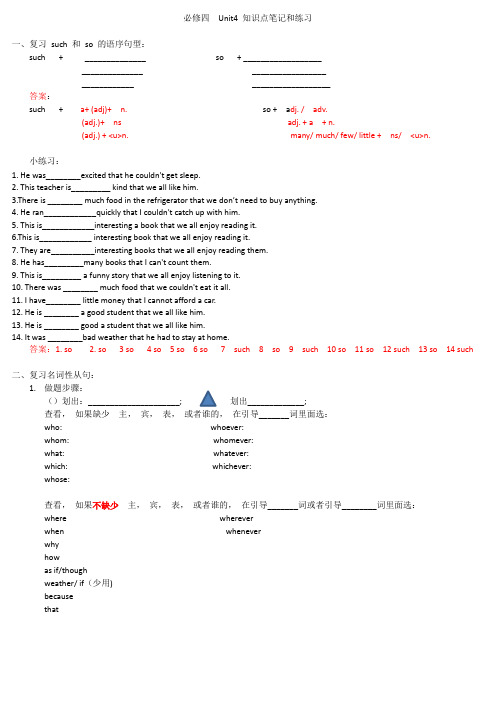
必修四Unit4 知识点笔记和练习一、复习such 和so 的语序句型:such + ______________ so + ________________________________ _____________________________ __________________答案:such + a+ (adj)+ n.so + a dj. / adv.(adj.)+ ns adj. + a + n.(adj.) + <u>n. many/ much/ few/ little + ns/ <u>n.小练习:1. He was________excited that he couldn't get sleep.2. This teacher is_________ kind that we all like him.3.There is ________ much food in the refrigerator that we don’t need to buy anything.4. He ran____________quickly that I couldn't catch up with him.5. This is____________interesting a book that we all enjoy reading it.6.This is____________ interesting book that we all enjoy reading it.7. They are__________interesting books that we all enjoy reading them.8. He has_________many books that I can't count them.9. This is_________ a funny story that we all enjoy listening to it.10. There was ________ much food that we couldn't eat it all.11. I have________ little money that I cannot afford a car.12. He is ________ a good student that we all like him.13. He is ________ good a student that we all like him.14. It was ________bad weather that he had to stay at home.答案:1. so 2. so 3 so 4 so 5 so 6 so 7 such 8 so 9 such 10 so 11 so 12 such 13 so 14 such二、复习名词性从句:1.做题步骤:()划出:_____________________; 划出_____________;查看,如果缺少主,宾,表,或者谁的,在引导_______词里面选:who: whoever:whom: whomever:what: whatever:which: whichever:whose:查看,如果不缺少主,宾,表,或者谁的,在引导_______词或者引导________词里面选:where whereverwhen wheneverwhyhowas if/thoughweather/ if(少用)becausethat答案:1.做题步骤:()划出:_从句_; 划出_从句中的谓语动词;查看,如果缺少主,宾,表,或者谁的,在引导代_词里面选:who: 指人(作主语)whoever: 无论任何人whom: 指人(作宾语)whomever: 无论任何人what: 东西whatever:无论任何东西which: 东西(有范围)whichever: 无论任何东西(有范围)whose: ……的查看,如果不缺少主,宾,表,或者谁的,在引导__副__词或者引导__连_词里面选:where 的地方wherever:无论...的地方when 的时间whenever:无论…的时间why 的原因how 的方式as if/though 好像whether/ if(少用) 是否because 因为that 无语意,只连接2.有用的小公式:1)和doubt 相关的从句,肯定句中,用_________引导;否定句中,用________引导。
七年级下册英语u3u4知识点

七年级下册英语u3u4知识点U31. 数字的表示法英语中数字的表示方法和中文不同,需要进行逐一学习和记忆。
其中,数字1至10的表示方法必须掌握,这是后续数字表示方法的基础。
2. 常用词汇本单元介绍了一些常用的英语词汇。
对于初学者来说,这些词汇是最基本的。
建议加强词汇记忆,并理解它们的含义和用法。
3. be 动词的运用英语中,be动词是非常基础的语法。
在本单元,学习者需要理解be动词的运用,以及它的肯定形式、否定形式和疑问形式。
4. 一般现在时一般现在时是英语中最常用的时态之一,涉及到很多简单句的构造方法。
学习者需要逐一学习这些方法,并用正确的方式应用于相应场景。
5. 特殊疑问句特殊疑问句是指以特殊疑问词开头的疑问句。
本单元介绍了what,where,when,why,how以及how old等常见疑问词。
学习者需要掌握这些疑问词的用法和在一般疑问句中的应用。
U41. 数量词英语中的数量词和中文有些不同,但数量词的使用却是非常重要的。
本单元介绍了some,any,a few,a little,much等常用数量词。
学习者需要掌握它们的含义和在句子中的应用。
2. 表示建议的句型在英语中,表示建议的句型是非常常见的。
学习者需要学习一些标准的建议句型,并熟练掌握它们。
同时,还需要掌握表示同意或者不同意的回答。
3. 一般过去时在英语中,一般过去时涉及到很多动词的过去式和过去分词形式,因此需要进行逐一学习。
同时还需要掌握一般过去时的构造方法以及在句子中的应用。
4. 表示频率的副词在英语中,表示频率的副词包括always,often,sometimes,rarely等。
学习者需要熟练掌握这些副词,并能在句子中使用它们。
5. 表示禁止的结构在英语中,表示禁止的结构包括no,must not,should not等。
学习者需要理解这些结构的含义,并掌握它们在句子中的使用。
U3 U4 语法知识点

Unit 3 Our animal friends1.have /has 用法:have 可用于第三人称单数之外的所有人称之后,has只能用于第三人称单数之后。
第三人称单数,有两种理解方式:A.是指he, she, it 和能用he, she, it来代替的所有单数B.是指除了I,you和复数之外的所有单数2.have/has 的肯定句结构为:(1)主语(除第三人称单数)+have+某物。
例如The twins have two fish. (2)主语(第三人称单数)+has+某物。
例如Mike has a cute dog.3. have/has 的一般疑问句结构为:Do+主语(除第三人称单数)+have+某物?例如Do the students have any animal friends? Yes, they do. / No, they don’t.Does+主语(第三人称单数)+have+某物?例如Does Mike have an animal friend? Yes, he does. / No, he doesn’t.3.have/has 的否定句结构为:(1)主语(除第三人称单数)+don't+have+某物。
例如They don’t have any rice. (2)主语(第三人称单数)+doesn't+have+某物。
例如She doesn’t have any water.4.can+动词原形(can后面的动词不随人称的变化而变化)例如:I can swim. She can jump.Unit 4 Hobbies(一)like +ing (动名词形式)动词原形--动名词形式:1)一般情况下,直接加ing形式:draw-drawing; read-reading; sing-singing2)以不发音e结尾的,去e加ing形式:dance--dancing; write--writing; make--making ride--riding; take--taking; like--liking, have-having3)重读闭音节(只有一个元音字母+一个辅音字母结尾)要双写结尾的辅音字母再加ing如:sit--sitting, swim--swimming, put--putting, run--running, shop--shopping,jog--jogging, forget --forgetting, get--getting, stop--stopping, begin--beginning (二)also与too都表示“也”Also放于行为动词前,be动词之后.(行前be后);Too放于句尾。
七年级上册英语u3u4知识点

七年级上册英语u3u4知识点第一章节:Unit 3
Unit 3的主要内容是描述人和物品,其中包含一些重要的词汇和语法结构。
(一)重点词汇
1. occupation 职业
2. engineer 工程师
3. pilot 飞行员
4. author 作者
5. stylist 发型师
6. designer 设计师
7. scientist 科学家
(二)重点语法结构
1. be动词的用法
2. 形容词的比较级和最高级
3. 物主代词的用法
4. 疑问词的用法
第二章节:Unit 4
Unit 4的主要内容是关于时间和活动的句子以及一些重要的词汇和语法结构。
(一)重点词汇
1. breakfast 早餐
2. lunch 午餐
3. dinner 晚餐
4. sports 运动
5. music 音乐
6. movie 电影
7. television 电视
(二)重点语法结构
1. 句型:What time do you...?
2. 介词的用法
3. 时间表达方法
总结
七年级上册英语U3U4的知识点主要集中在人物和物品描述以
及时间和活动的表达上。
通过学习这些知识点,我们能够更好地
掌握英语的基础知识,为学习和使用英语打下坚实的基础。
同时,我们需要不断的加强对这些知识点的掌握和应用,以便在日后的
学习和实践中运用自如。
[译林版]3A Unit4知识点
![[译林版]3A Unit4知识点](https://img.taocdn.com/s3/m/387fa24da9114431b90d6c85ec3a87c240288a9b.png)
3A Unit 4知识点一、单词1.family家,家庭2. father 父亲,爸爸3.mother 母亲,妈妈4.brother 哥哥(弟弟)5. sister 姐姐(妹妹)6. me我7. grandfather/grandpa祖父,外祖父8.grandmother/ grandma 祖母,外祖母二、短语1. my family 我的家庭2. my father 我的爸爸3.my mother 我的妈妈4. my brother 我的哥哥(弟弟)5. my sister 我的姐姐(妹妹)6. my friend 我的朋友7. I am我是you are 你是he is 他是it is 它是三、句子1. This is my family. 这是我的家庭。
2. This is my mother. 这是我的妈妈。
3. This is my father. 这是我的爸爸。
4. This is Tim.这是蒂姆。
5. He’s my brother. 他是我的哥哥(弟弟)。
6. He’s my brother, Tim. 他是我的弟弟,蒂姆。
7. This is my brother, Tim. 这是我的弟弟,蒂姆。
8. She’s my sister. 她是我的姐姐(妹妹)。
9. She’s my sister, Helen. 她是我的妹妹,海伦。
10. This is Helen. 这是海伦。
11. This is my sister, Helen. 这是我的妹妹,海伦。
12. This is me. 这是我。
13. Good evening. 晚上好。
Good morning.早上好。
Good afternoon.下午好。
14. You’re my friend. 你是我的朋友。
15. You are my friend,too. 你也是我的朋友。
16. Nice to meet you. 见到你很高兴。
必修3 Unit 4知识点梳理

3.What it was to become was uncertain until between 4.5 and 3.8 billion years ago when
globe.它 地球) the dust settled into a solid globe.它(地球)
将成为什么样子一直是个谜,直到45~38亿年以前 将成为什么样子一直是个谜,直到45~38亿年以前 45 这些尘埃凝聚成一个固体球体。 这些尘埃凝聚成一个固体球体。 be to do sth. 考点提炼 (1)表示 应当/必须做某事” 表示“ (1)表示“应当/必须做某事”,通常用于通知和 说明书里。 说明书里。 (2)表示“按计划或安排将要做某事 ,其完成式 (2)表示“______________________”, 表示 ______________________” 则表示“本来打算做某事” 则表示“本来打算做某事”。 (3)表示“将来不可避免要发生的事” (3)表示“将来不可避免要发生的事”。 表示
of等 lot of,lots of,a quantity of,quantities of等。
不同但比较的项目相同。 不同但比较的项目相同。 (2)主语相同,但比较的项目不同。 (2)主语相同,但比较的项目不同。 主语相同 much/many+名词+as分句 名词+as (3)as much/many+名词+as分句 He took as much butter as he needed. 他带的这些黄油够需要的。 他带的这些黄油够需要的。 (4)as+形容词原级+名词词组+as分句 (4)as+形容词原级+名词词组+as分句 形容词原级 +as as+adj.+a(n)+n.+as句型是“as...as”结构的一 as+adj.+a(n)+n.+as句型是“as...as”结构的一 adj.+a(n)+n.+as句型是 种变化形式。 as的这种用法类似的词还有too... 种变化形式。与as的这种用法类似的词还有too... 的这种用法类似的词还有 to...句型中的too,感叹句中的how, to...句型中的too,感叹句中的how,so...that... 句型中的too,感叹句中的how 句型中的so等 句型中的so等。 so Jack is as efficient a worker as Bill. 杰克和比尔都是工作效率很高的工人。 杰克和比尔都是工作效率很高的工人。
九年级英语人教版u43a知识点

九年级英语人教版u43a知识点九年级英语人教版U43A是初中九年级学生学习英语的一本教材,其中包含了很多重要的知识点。
在本文中,我们将就这些知识点进行分析和讨论,以帮助学生更好地掌握这些内容。
第一部分:语法知识点在九年级英语人教版U43A中,语法知识点占据了很大的篇幅。
其中,包括了各种时态的用法、被动语态、虚拟语气等重要的语法结构。
这些知识点对于学生来说是非常关键的,因为它们是英语语法的基础,掌握好了这些知识点,学生就能够更加流利地表达自己的意思。
例如,在被动语态的学习中,学生需要注意及物动词和不及物动词的转换。
这一知识点不仅要求学生记住一系列的动词,还需要学生掌握其在句子中的用法和变化形式。
此外,在虚拟语气的学习过程中,学生需要了解各种情况下的虚拟语气的使用方法,例如对未来不可能实现的愿望或建议的表达等。
第二部分:听力技巧九年级英语人教版U43A中,听力部分是学生们必须面对和解决的难题之一。
为了帮助学生提升听力技巧,这本教材提供了大量的听力材料和练习题。
这些材料包括了各种场景和语境,帮助学生熟悉不同的语音、语调和语速。
为了更好地应对听力部分,学生们需要学会一些技巧。
比如,他们可以通过仔细倾听关键信息、提前预测后续内容、注意词汇和语法的重要性等来提升自己的听力水平。
除此之外,学生们还可以通过多听英语材料、和外国人交流以及利用各种听力资源来提高自己的听力技巧。
这些技巧需要学生在实践中不断尝试和探索。
第三部分:阅读理解阅读理解是九年级英语人教版U43A中的重要内容之一。
这部分内容包括了各种不同题型的阅读理解题目,例如选择题、填空题、判断题等。
学生们需要通过阅读英语文章,理解文章的主要意思,并根据问题选择正确的答案。
对于学生来说,提高阅读理解能力需要进行有针对性的训练。
他们可以通过多读英语文章、培养阅读的习惯以及扩大词汇量来提高自己的阅读能力。
此外,学生们还可以通过解析和分析文章的结构和语法,来更好地理解文章的意思。
牛津版英语三年级知识点总结

牛津英语三年级知识点整理3A U1:Hello学习目标学习各种动物的英文词汇学习询问他人的姓名和介绍自己的名字根据叫声识别动物学习冠词a/an主要知识点●What's your name? 用来询问对方的姓名。
答复可以说:My name's…或者说:I'm…I'm…可以用来介绍自己的姓名。
●冠词a/an:a 用在以辅音因素开头的可数名词单词之前;an 用在以元音音素开头的可数名词单词之前。
3A U2:Nice to meet you学习目标学习各种颜色的表达。
学习交际用语:Nice to meet you.询问颜色:What colour is it?学习用“This is…〞来介绍人。
主要知识点●Miss 用于称呼未婚女士;Mr 用于称呼男性;Mrs 用于称呼已婚女士。
●初次与人见面,相互介绍以后,可以说:Nice to meet you. 表达很快乐认识对方。
答复可以说:Nice to meet you, too.●This is ... 可以用来介绍人。
比方:This is Helen. 这是海伦。
●What colour is it? 可以用来询问事物的颜色。
3A U3:This is my father学习目标学习各种水果的表达。
学习用“This is my... 〞来介绍家人。
学习句型:I can see a…/some…主要知识点●“This is my... 〞可以用来介绍家人。
my 表示“我的〞,是形容词性物主代词。
例如:This is my mother. 这是我的妈妈。
●I can see …〞表示“我能看到...〞。
例如:I can see a banana. 我能看到一支香蕉。
●表示一个人或事物,名词用单数,前面加不定冠词a/an。
如:an apple 一个苹果。
表示一个以上的人或事物,名词用复数。
some 可以用来修饰名词的复数。
如:some mangoes 一些芒果。
译林版三上英语3AUnit4 单元知识点自默纸
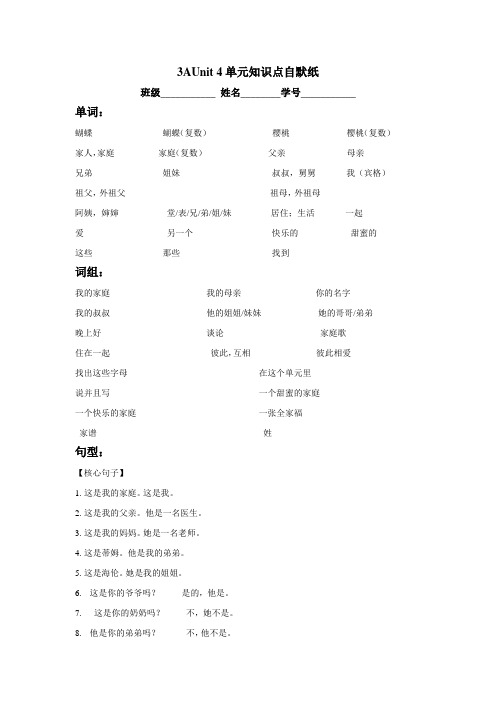
3AUnit 4单元知识点自默纸班级___________ 姓名________学号___________单词:蝴蝶__________ 蝴蝶(复数)______________ 樱桃___________ 樱桃(复数)_______ 家人,家庭__________家庭(复数)____________ 父亲____________ 母亲____________ 兄弟___________ 姐妹____________________ 叔叔,舅舅______ 我(宾格)_______ 祖父,外祖父_____________ _____________ 祖母,外祖母___________ __________ 阿姨,婶婶___________堂/表/兄/弟/姐/妹________ 居住;生活_______一起____________ 爱_____________ 另一个_______________ 快乐的___________ 甜蜜的__________ 这些___________ 那些__________________ 找到_____________词组:我的家庭____________________ 我的母亲________________ 你的名字________________ 我的叔叔____________________ 他的姐姐/妹妹____________ 她的哥哥/弟弟__________ 晚上好______________________ 谈论_____________________ 家庭歌_________________ 住在一起____________________ 彼此,互相______________ 彼此相爱________________ 找出这些字母___________________________ 在这个单元里________________________ 说并且写______________________________ 一个甜蜜的家庭______________________ 一个快乐的家庭_________________________ 一张全家福___________________________ 家谱__________________________________ 姓__________________________________句型:【核心句子】1.这是我的家庭。
U3U4知识点整理

U3U4知识点整理词组短语:1.Miss小姐;女士2.Mr 先生3.my dear 我的宝贝4.You’re right.你对了/你是对的。
5.my friend 我的朋友6. my friends我的朋友们7.my sister 我的妹妹/姐姐8. she’s=she is她是9. he’s=he is 他是10. See you. 再见。
11. next time 下一次12. See you next time .下次见。
13. evening晚上14. Good evening. 晚上好。
15. Good night. 晚安。
16. who is ...? =who’s ...? (...是谁?)句子:介绍他人有三种方式例如介绍苏海:She’s Su Hai. She is Su Hai. 她是苏海。
This is Su Hai . 这是苏海。
例如介绍刘涛:He’s Liu Tao . He is Liu Tao . 他是刘涛。
This is Liu Tao . 这是刘涛。
介绍自己的朋友:She’s …She’s my friend.He’s …He’s my friend.This is…He/She is my friend.★注:too表示也,介绍第二个朋友时可以加在句子的最后。
介绍自己的家庭:This is my family.介绍自己的家庭成员:This is my grandpa/grandma/father/mother/brother/sister/me.They all live together.他们都住在一起。
They all love one another.他们相亲又相爱。
八下英语unit4 sectionA 3a-3c知识点
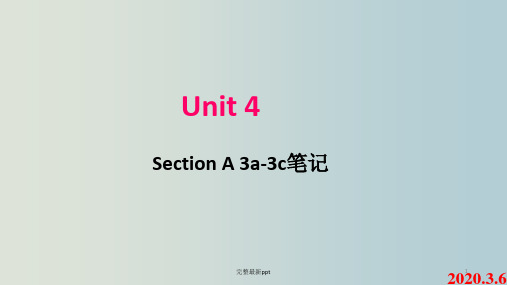
the relation between cause and effect
因果关系
他不知道为什么和弟弟之间的关系变得更糟糕了。
He didn’t know why the relation between him and his brother
got even worse. communication n. 交流 、沟通 communicate v. communicate with… 与…沟通/交流
I got on well with my teachers and classmates last term. How are you getting along with your study?
你和他处得来吗? Can you get on/along with him?
他很容易相处。 It’s easy to get on with him.
We didn’t go by bus. Instead, we walked there.
We went there on foot instead完o整最f新bppyt bus.
5
用 instead , instead of 填空 1.Dave went swimming __i_n_st_e_a_d__o_f___ going skating. 2.My brother isn’t good at math. _I_n_s_te_a_d__, he is good at English. 3.I like reading in the library i_n_s_t_e_a_d_o_f_ in the classroom. 4. Yesterday, John _i_n_s_te_a_d__o_f Jim gave us a talk. 5.---Does your brother go to the library?
(译林版)3A 第四单元语法总结与扩充图文结合
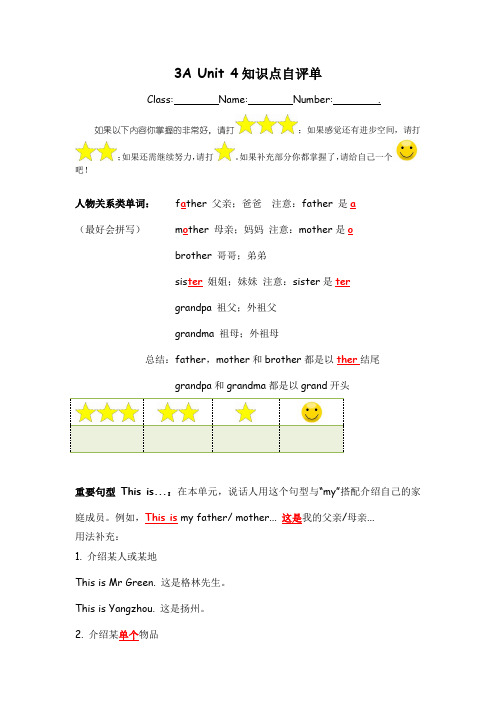
3A Unit 4 知识点自评单Class: Name: Number: .如果以下内容你掌握的非常好,请打 ; 如果还需继续努力, 请打 吧!;如果感觉还有进步空间,请打 。
如果补充部分你都掌握了, 请给自己一个人物关系类单词: (最好会拼写)father 父亲;爸爸 注意:father 是 a mother 母亲;妈妈 注意:mother 是 o brother 哥哥;弟弟 sister 姐姐;妹妹 注意:sister 是 ter grandpa 祖父;外祖父 grandma 祖母;外祖母总结:father,mother 和 brother 都是以 ther 结尾 grandpa 和 grandma 都是以 grand 开头重要句型 This is...:在本单元,说话人用这个句型与“my”搭配介绍自己的家 庭成员。
例如,This is my father/ mother... 这是我的父亲/母亲... 用法补充: 1. 介绍某人或某地 This is Mr Green. 这是格林先生。
This is Yangzhou. 这是扬州。
2. 介绍某单个物品This is a dog. 这是一条狗。
提醒:This is my 后面不能加人名,例如不能说,This is my Liu Tao. 因为刘 涛这个人不是你的私有物品。
打招呼用语:Good evening. 晚上好,可以用于晚上六点之后熟人之间打招呼。
补充:Good evening. 和 Good night. 有所不同。
前者表示晚上睡 觉前和其他人说的道别礼貌用语,即“晚安”。
me 宾格的“我”:通常用于句子的末尾或句中。
例如: Look at me. 看我。
This is me. 这是我。
Show me your book. 让我看看你的书。
大写字母 I 是主格的“我”,做主语,通常用于句首。
Family song 中的歌词:They live together. 他们都住在一起。
英语必修三U4知识点
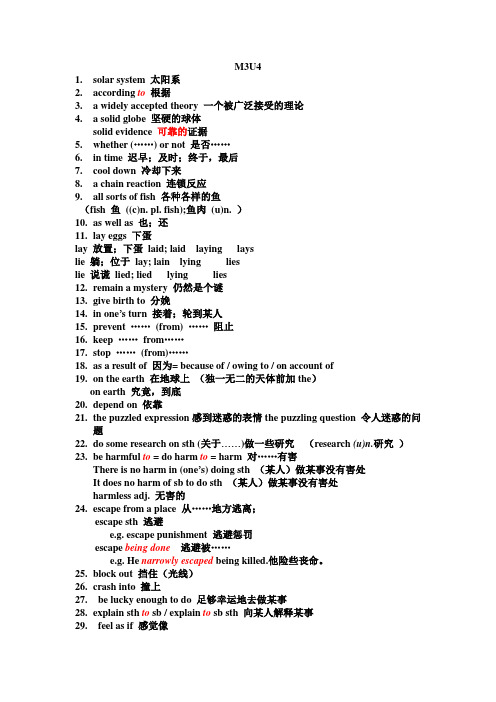
M3U41.solar system 太阳系2.according to根据3. a widely accepted theory 一个被广泛接受的理论4. a solid globe 坚硬的球体solid evidence 可靠的证据5.whether (……) or not 是否……6.in time 迟早;及时;终于,最后7.cool down 冷却下来8. a chain reaction 连锁反应9.all sorts of fish 各种各样的鱼(fish 鱼((c)n. pl. fish);鱼肉(u)n. )10.as well as 也;还y eggs 下蛋lay 放置;下蛋laid; laid laying layslie 躺;位于lay; lain lying lieslie 说谎lied; lied lying lies12.remain a mystery 仍然是个谜13.give birth to 分娩14.in one’s turn 接着;轮到某人15.prevent ……(from) ……阻止16.keep ……from……17.stop ……(from)……18.as a result of 因为= because of / owing to / on account of19.on the earth 在地球上(独一无二的天体前加the)on earth 究竟,到底20.depend on 依靠21.the puzzled expression感到迷惑的表情the puzzling question 令人迷惑的问题22.do some research on sth (关于……)做一些研究(research (u)n.研究)23.be harmful to = do harm to = harm 对……有害There is no harm in (one’s) doing sth (某人)做某事没有害处It does no harm of sb to do sth (某人)做某事没有害处harmless adj. 无害的24.escape from a place 从……地方逃离;escape sth 逃避e.g. escape punishment 逃避惩罚escape being done 逃避被……e.g. He narrowly escaped being killed.他险些丧命。
九年级英语u43a知识点

九年级英语u43a知识点九年级英语U43A知识点是关于英语课程中的第43单元的内容总结和重点归纳。
本文将重点介绍这一单元中的主要知识点和相关例句,并提供一些相关练习题供学生巩固所学知识。
一、动词的时态英语中有多种时态,包括一般现在时、一般过去时、一般将来时等。
以下是这些时态的用法和示例:1. 一般现在时:表示现在的状态或经常发生的动作- I go to school every day.(我每天去上学。
)- She plays the piano very well.(她钢琴弹得很好。
)2. 一般过去时:表示过去发生的动作或状态- We watched a movie last night.(昨晚我们看了一部电影。
) - He lived in London two years ago.(两年前他住在伦敦。
)3. 一般将来时:表示将来要发生的动作或状态- They will visit their grandparents next week.(他们下周将拜访他们的祖父母。
)- I am going to travel to Paris next month.(下个月我打算去巴黎旅行。
)二、被动语态被动语态是指将主动语态中的动作直接转换为被动形式。
被动语态的结构为:be + 过去分词。
以下是一些示例:- Active: The boy broke the window.(主动语态:男孩打破了窗户。
)Passive: The window was broken by the boy.(被动语态:窗户被男孩打破了。
)- Active: They are cleaning the classroom.(主动语态:他们正在打扫教室。
)Passive: The classroom is being cleaned by them.(被动语态:教室正在被他们打扫。
)三、情态动词情态动词用于表示说话人对某种行为的态度、意愿或推测。
(完整版)人教版高一英语必修3UNIT4知识点总结
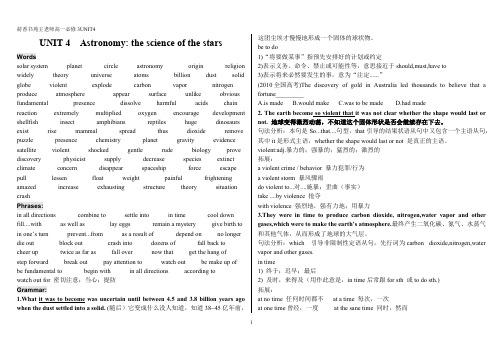
ll die out
block out
crash into
dozens of
fall back to
A cheer up
twice as far as fall over
now that get the hang of
step forward break out pay attention to
watch out be make up of
r 单词积累:existence n.存在,生存 existing adj.现存的,现行的
fo 拓展:come into existence /being 形成,出现 in existence 现存的;存在的
disappear
spaceship
force
escape
e pull
lessen
float
weight
painful
frightening
th amazed
increase
exhausting
structure theory
situation
in crash
Phrases:
gs in all directions
billion dust solid
d globe
violent
explode
carbon
vapor
nitrogen
o produce
atmosphere
appear
surface
unlike
obvious
go fundamental
presence
dissolve harmful
acids chain
subtract v.减;减去;扣除 minus prep.减去
- 1、下载文档前请自行甄别文档内容的完整性,平台不提供额外的编辑、内容补充、找答案等附加服务。
- 2、"仅部分预览"的文档,不可在线预览部分如存在完整性等问题,可反馈申请退款(可完整预览的文档不适用该条件!)。
- 3、如文档侵犯您的权益,请联系客服反馈,我们会尽快为您处理(人工客服工作时间:9:00-18:30)。
3A Unit 4 My family 知识点
一、词汇与交际用语
my family 我的家庭Mike’s family 迈克的家庭
This is my…这是我的。
This is my father. 这是我的父亲
father 父亲mother 母亲brother 哥哥,弟弟sister 姐姐,妹妹
me 我This is me! 这是我!
grandpa 祖父,外祖父grandma 祖母,外祖母
Who’s he? He’s my father. 他是谁?他是我的父亲。
Good evening. 晚上好
(P.28歌曲)They all live together. 他们都生活在一起
They love one another. 他们都相亲相爱。
二、介绍范例(要求熟练)
Hello! I’m Mike. Look! This is my family. This is my father. This is my mother.
This is Tim. He’s my brother. This is Helen. She’s my sister. This is me.
三、字母,缩写词,单词
O o P p Q q R r S s T t
cap 鸭舌帽pie 馅饼green 绿色的air 空气coat 外套
PLA 中国人民解放军CEO 首席行政官IQ 智商BBQ 烧烤
GPS 全球定位系统PRC 中华人民共和国ATM 自动取款机
SOS 紧急求救信号
四、快速读出下列字母
G Q P O P L F H J G E I D Q F M I G
D F G B Q P P O G O I
E L H Q P
F I I E M D P
G Q
d b q g p q g d q l
e i p l
f o i e i f d o p g
i f g j d i b f q f h j p d f j p g p o p d q f p。
